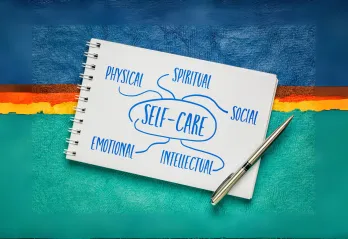August Mental Health Article

Self-care is about the holistic care of oneself, aiming to improve both physical and mental health. It goes beyond immediate self-soothing activities, like taking a warm bubble bath, drinking a glass of wine, or binge-watching Netflix. These activities can provide temporary relief during stressful moments but don't necessarily contribute to long-term well-being.
True self-care involves nurturing all eight dimensions of wellness:
- Emotional: Activities that help you feel positive and emotionally balanced.
- Occupational: Finding satisfaction and enrichment in your work.
- Intellectual: Engaging in mentally stimulating activities.
- Environmental: Creating a living space that supports your well-being.
- Financial: Managing your finances to reduce stress and increase stability.
- Social: Building supportive and healthy relationships.
- Physical: Maintaining your physical health through exercise, nutrition, and sleep.
- Spiritual: Finding purpose and meaning in life.
Feeling unsafe or under financial stress can significantly impact your well-being, highlighting the importance of addressing all dimensions. A great resource to guide you is the Olga Phoenix Self-Care Wheel, which provides a structured approach to self-care across these dimensions.
Although it may seem overwhelming to take care of yourself in all these areas, integrating self-care into your daily routine can help. Here are some tools and tips to build self-care habits:
How to Build Self-Care Habits
- Start Small: Begin with one or two self-care activities that resonate most with you. Gradually incorporate more as you become comfortable.
- Set Realistic Goals: Define clear, achievable goals for each dimension of wellness. For example, aim to walk for 30 minutes three times a week for physical wellness.
- Create a Routine: Schedule specific times for your self-care activities to ensure consistency. Treat these times as non-negotiable appointments with yourself.
- Use Reminders: Set reminders on your phone or use a planner to help you stay on track.
- Track Your Progress: Keep a journal or use an app to monitor your self-care activities and reflect on your progress.
- Stay Flexible: Life can be unpredictable. Be kind to yourself and adjust your routine as needed without feeling guilty.
The Role of Discipline
Discipline is crucial for forming new habits. Research suggests it takes 21-30 days to form a new habit. During this period, rely on discipline to consistently perform your chosen self-care activities.
- Commit to Consistency: Even on days when motivation is low, stick to your routine.
- Be Patient: Understand that building habits takes time. Focus on the long-term benefits.
- Celebrate Small Wins: Acknowledge and celebrate your progress, no matter how small.
The Benefits
As you build and maintain these habits, you'll start to experience the benefits of comprehensive self-care. Over time, these habits will become a natural part of your daily life, contributing to your overall well-being and helping you thrive in all areas.
By focusing on building discipline and consistency, you'll form habits that support your self-care, leading to a healthier, more balanced life.
To Learn More about Building Habits; Check Out Y360 Video First you Form Habits, Then They Form You
Recommended Resources
For those interested in further exploring the science of habit formation and practical strategies for building positive habits, I highly recommend Atomic Habits by James Clear.
For those interested in further exploring self-care, I highly recommend Real Self-Care by Pooja Lakshmin.